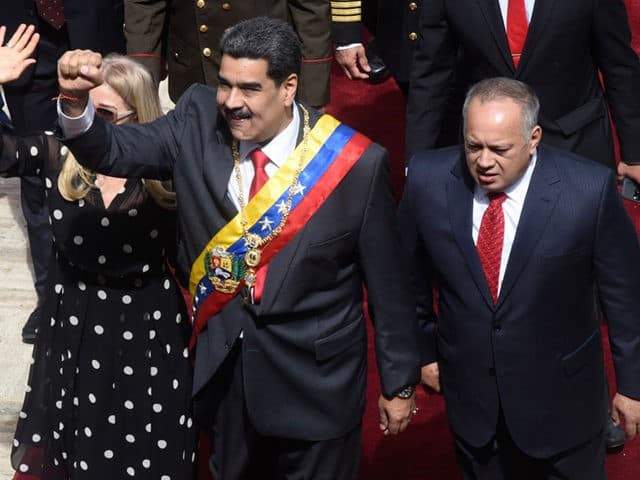Latin American Socialists Honor Dead Iranian Terrorist Qasem Soleimani

Socialist leaders in Latin America, most prominently those in charge of the dictatorship in Venezuela, observed the anniversary of a drone strike against leading Iranian terrorist Qasem Soleimani this weekend with vocal condemnations of America and statements of solidarity with Iran.
Soleimani, a major general in the Islamic Revolutionary Guard Corps (IRGC), was in charge of the organization’s Quds Force, its foreign terrorist operations wing. The IRGC is a U.S.-designated terrorist organization. American officials believe Soleimani was responsible for thousands of American deaths and injuries. Reports also indicate Soleimani was largely responsible for Iran’s foreign policy throughout Latin America.
The government of Venezuela, through its foreign ministry, issued an official statement honoring Soleimani on Sunday, the anniversary of the airstrike against him.
“The government of the Bolivarian Republic of Venezuela sends a fraternal greeting to the people and leaders of the Islamic Republic of Iran, rendering tribute to the memory of the martyr, Major General Qasem Soleimani,” a statement written by Foreign Minister Jorge Arreaza read, “unforgettable leader and commander of the Quds Force of the Islamic Revolutionary Guard Corps, assassinated via willful criminal terrorist activity a year ago on orders of the nefarious administration of [U.S. President] Donald Trump.”
“General Soleimani was an example of the bravery, struggle, and firmness in the guarantee of the liberation of territories occupied by foreign forces and in the fight against terrorist groups that the erratic interventions of the West left seeded in the Middle East,” Arreaza wrote. “The martyr Soleimani struggled for the consolidation of the axis of resistance and sovereign of peoples and for a new equation in the geometry of the regional powers in favor of peace.”
Venezuelan state media favorably covered mass events in Iraq, organized by the pro-Iran Popular Mobilization Forces (PMF), on Sunday. Soleimani died alongside Abu Mahdi al-Muhandis, the head of the Hezbollah Brigades, a PMF unit. The PMF organized a march of thousands of people this weekend, beginning with a mock funeral procession late Saturday in Baghdad, despite social distancing measures in place to combat the Chinese coronavirus pandemic.
In the immediate aftermath of the airstrike against Soleimani last year, Venezuelan socialist media proclaimed him a hero. Senior members of dictator Nicolás Maduro’s regime organized a memorial service in Caracas for him, led by Maduro’s second-in-command, Diosdado Cabello. Video from the event shows Cabello writing, “your death will be avenged,” in a guestbook. American law enforcement officials believe Cabello to be a senior member, if not the boss of, the Cartel de los Soles, a multicontinental cocaine trafficking outlet.
Venezuela and Iran have maintained close ties since the rise of dictator Hugo Chávez in the early 2000s. As recently as a month ago, American officials were expressing concern that Iranian terrorist operations were being planned and organized through Venezuela.
The head of the U.S. Southern Command, Admiral Craig Faller, said in December that members of Soleimani’s Quds Force had recently traveled to Venezuela to expand their operations throughout Latin America.
“We see a growing Iranian influence in there,” Faller told the Wall Street Journal. “We’re real [sic] concerned about what Iran is up to, not just globally, but here in this hemisphere.”
Among those condemning the United States for its strike against Soleimani this weekend was a key ally of Maduro’s, former Bolivian President Evo Morales.
The struggle against imperialism has heroes and martyrs in the world, like Gen. Qasem Soleimani, murdered a year ago,” Morales wrote on Twitter on Sunday. “The peoples recognize his struggle for justice and the defense of the sovereignty of nations that suffer external aggression. We join the homage to him in Iran.”
Under Morales, Bolivia also became a socialist state and close ally of Iran’s. Morales voluntarily resigned in November 2019, then claimed he was the victim of a “coup” when, following the flight of most of his senior officials, a conservative senator, Jeanine Áñez, became interim president. Áñez organized an election last year won by Morales’ party, Movement Towards Socialism (MAS), and vacated the leadership without a fight.
Morales has since returned to Bolivia despite open investigations against him for crimes such as terrorism and pedophilia.
The violent communist government of Nicaragua also honored Soleimani on Saturday, according to the Iranian news agency IRNA.
“Sympathizing with Iranian and Iraqi people, Nicaragua described Washington’s crime as international terrorism,” IRNA reported. “It also confirmed Iraqi government’s stance with regard to violating its territorial integrity by the U.S. and also that of Iran regarding breach of international regulations by Washington.”
The Iranian Islamic regime also claimed through its state media arms that nations such as Syria, Russia, and Azerbaijan issued statements against the airstrike that eliminated Soleimani.
President Donald Trump has repeatedly defended his decision to allow an airstrike against Soleimani and al-Muhandis, noting that PMF allies had attacked the U.S. embassy in Baghdad a week before the strike, spray-painting the phrase “Soleimani is our commander” onto the side of the building. While the Iranian regime continues to claim that Soleimani’s main role in Iraq was fighting the Islamic State, American intelligence indicates that he was working with PMF and other Shiites forces to attack American troops.
Photo: Carolina Cabral/Getty Images
Link: https://www.breitbart.com/middle-east/2021/01/04/latin-american-socialists-honor-dead-iranian-terrorist-qasem-soleimani/











